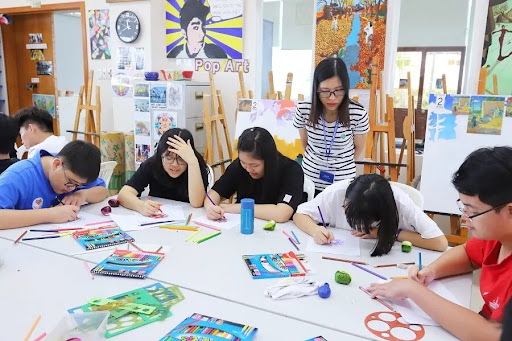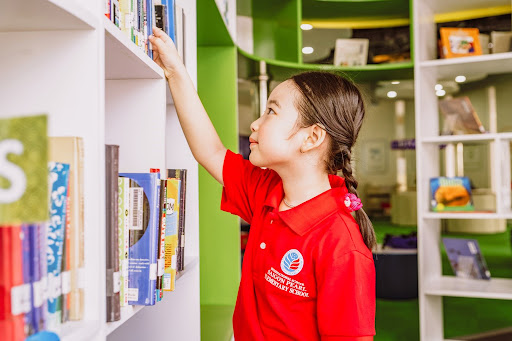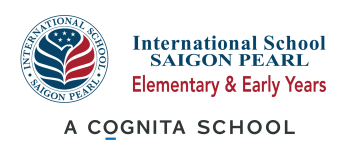Nowadays, Vietnam’s economy is developing, along with education models are also more and more diverse. When the demand for the children’s comprehensive development is getting bigger which public schools can only partially meet, Vietnamese families tend to send their children to international schools. However, the definition of an international school is still quite new to some parents. So what are international schools? Which international school is the most suitable for your children? Let’s take a look at International School Saigon Pearl‘s article below.
What are international schools?
So, what are international schools? International School is an organization that promotes international education for a multicultural community. International schools are often located in major cities to provide children abroad as well as domestic children with education in an international framework.
Although there is no uniform definition or criteria, international schools are often characterized by a multinational group of students, multilingual instruction, and curricula geared toward different perspectives and subjects.
>> Read more: How many types of fees are included in international school fees?

What are international schools (Source: ISSP)
Many international schools adopt curricula from programs and organizations such as International Baccalaureate, Edexcel, Cambridge Assessment International Education, International Primary Curriculum, or Advanced Placement. Following one of these accredited curricula helps to ensure that international students can easily transfer between international schools or back to their home country. It also means that any exams taken in international schools will be valid in other countries.
>> Read more: What is the Difference Between the American Curriculum and IB?
How do international schools differ from bilingual schools?
So when you already know what international schools are. You will need to gain a deep insight into the difference between international schools and bilingual schools.
The first difference is the curriculum: International schools offer a wide range of curriculum choices, often depending on the national identity of the school. For schools that are open to all nationalities and teach one curriculum throughout, typically three curriculum options are available: U.S., English National (British), or International Baccalaureate (IB). Sometimes international schools also offer hybrid options, blending different types of curricula. Each type of curriculum impacts the ethos of a school differently, so it’s important to understand the differences between them.
On the other hand, bilingual schools teach simultaneously 2 educational programs that makes students overwhelmed at some points. Additionally, learning bilingual languages at the same time can split the concentration of students, especially with students who still struggle to learn a second language.
The second is instruction language: All subjects at international schools are exclusively taught in English, providing students with a comprehensive and immersive English language learning environment. Nevertheless, international schools still have supplementary Vietnamese classes for their Vietnamese students. Conversely, bilingual schools adopt a dual-language approach, where the mother tongue and one foreign language such as French, Chinese, or Japanese,… are taught alongside each other.
The last point is cultural diversity: Education in international schools fosters liberation, emphasizing freedom of thought, individual expression, and the development of new ideas. In contrast, Vietnam’s education system is influenced by Confucian values, focusing on hierarchical order and collective superiority over individuality, with an emphasis on restraint rather than freedom. It’s important to note that neither culture is inherently better; each has its advantages and disadvantages. The choice should be based on what suits one’s family or individual preferences.
>> Read more: International education program for preschool children – ISSP

The difference between international schools and local schools (Source: Internet)
Why should you choose an international school for children?
Attending an international school is a valuable experience for students of all ages. Education at an international school allows students to experience differences in various cultures and environments. These experiences will help children broaden their horizons, close language gaps, become proficient in different languages, and have greater opportunities for further study, often abroad. An international school diploma is recognized and valid all over the world, which gives children prestige to further personal growth. There is no doubt that many parents always want their children to attend an international school.
Modern facility
Facilities at international schools are fully invested and modern. Advanced learning equipment, some schools also import equipment, furniture, school supplies… from countries like the US and UK, so the quality and safety are high. Newly designed classrooms, space optimization, large campus, with many separate areas to meet the entertainment needs of students such as swimming pool area, sports area, club activities area, art area … The laboratories at the international school are reasonably built, safe, and equipped with modern equipment for students to practice the subject.

Facilities at international schools are fully invested and modern (Source: ISSP)
International curriculums
The curriculum at English-speaking international schools is often based on a UK education, a US education or a curriculum specifically designed for international schools, such as the International High School Certificate of Education or the IB Diploma Program. These international curricula are committed to internationalism, developing global citizenship, providing optimal learning environments, and teaching in an international setting that promotes understanding, independence, and cooperation.
Similar to other schools, international schools teach language arts, mathematics, science, humanities, arts, physical education, information technology, and design technology. More recently, primary-level education has seen the introduction of the IB Primary Program (PYP) and the International Primary Curriculum (IPC). For secondary education, students have access to the relaunched IB Middle School Program (MYP) and the redeveloped International Middle School Curriculum (IMYC).
One of the good reasons to choose an international school is that the degrees offered by international schools are mostly internationally recognized. This is a key factor to consider in choosing your children school. An international curriculum not only equips them with globally recognized education and qualifications but also means they can transition easily from one school to another. The IB curriculum is also known for its emphasis on critical and independent thinking. All of these things make students more competent and internationally minded.

International curriculums help children develop comprehensively (Source: ISSP)
Quality teachers
International schools often choose native or multi-national teachers (with internationally recognized qualifications). Most of the teachers are foreigners, and a small number of teachers at bilingual schools are Vietnamese. The method of selection of teachers is mainly through application review and interviews.
In schools, teachers are the force directly performing the task of teaching and educating students; which is a decisive factor in ensuring the quality of education. Therefore, international schools always uphold the role of teachers. Regardless of recruitment, both Vietnamese teachers and foreign teachers have to go through the interview and trial rounds after passing the pre-qualification round (about the profile according to the professional standards & requirements of each school). Therefore, in addition to the professional qualifications requirements, teachers must have stable teaching competence and experience to be selected. For foreign teachers, to ensure the quality of international programs, international schools only recruit foreign teachers who have teaching qualifications. After the selection, the teachers are all trained regularly in their expertise and other specific requirements: the application of information technology in teaching, personalized education methods, etc.
In addition to the requirement of implementing a series of personalized teaching methods, international schools encourage teachers to implement new teaching methods and forms to promote students’ initiative, positivity, and creativity.
>> Read more: Highly experienced and dedicated teachers at International School Saigon Pearl

International schools often choose native or multi-national teachers ( Source: ISSP)
International School Saigon Pearl – Who are we?
So what are international schools? Or which international school is ideal for your child? Let’s take a look at International School Saigon Pearl’s introduction. The curriculum at ISSP is an integrated international program built on American standards, standards of the Ministry of Education and Training of Vietnam along with the IB PYP curriculum framework, which affects the comprehensive development of students and helps them become model global citizens.
At ISSP, in addition to classroom learning, students can participate in many extra-curricular activities such as sports activities (soccer, basketball, volleyball), visual arts activities, STEAM activities, language development activities…
>> Read more: The international learning environment at International School Saigon Pearl
Along with investing in modern facilities, an international standard curriculum, and applying technologies to support teaching and learning, ISSP also pays great attention to the teaching staff at the school.
ISSP also regularly organizes training sessions for teachers on child safety and protection programs, child psychology, how to behave with children… This helps each teacher interact and support their students better.
For more information about specific facilities or programs, parents can schedule a school tour or contact ISSP Admissions Office via the following contact methods:
- Phone number: +84 (028) 2222 7788
- Email: admissions@issp.edu.vn
ISSP hopes that the above article will help parents have a deep understanding of what are international schools and be able to distinguish the differences between public schools and international schools. So, they can make the right decision to send their children to the ideal international school. If you want to know good reasons to choose an international school or different types of international schools, please check out our website.







